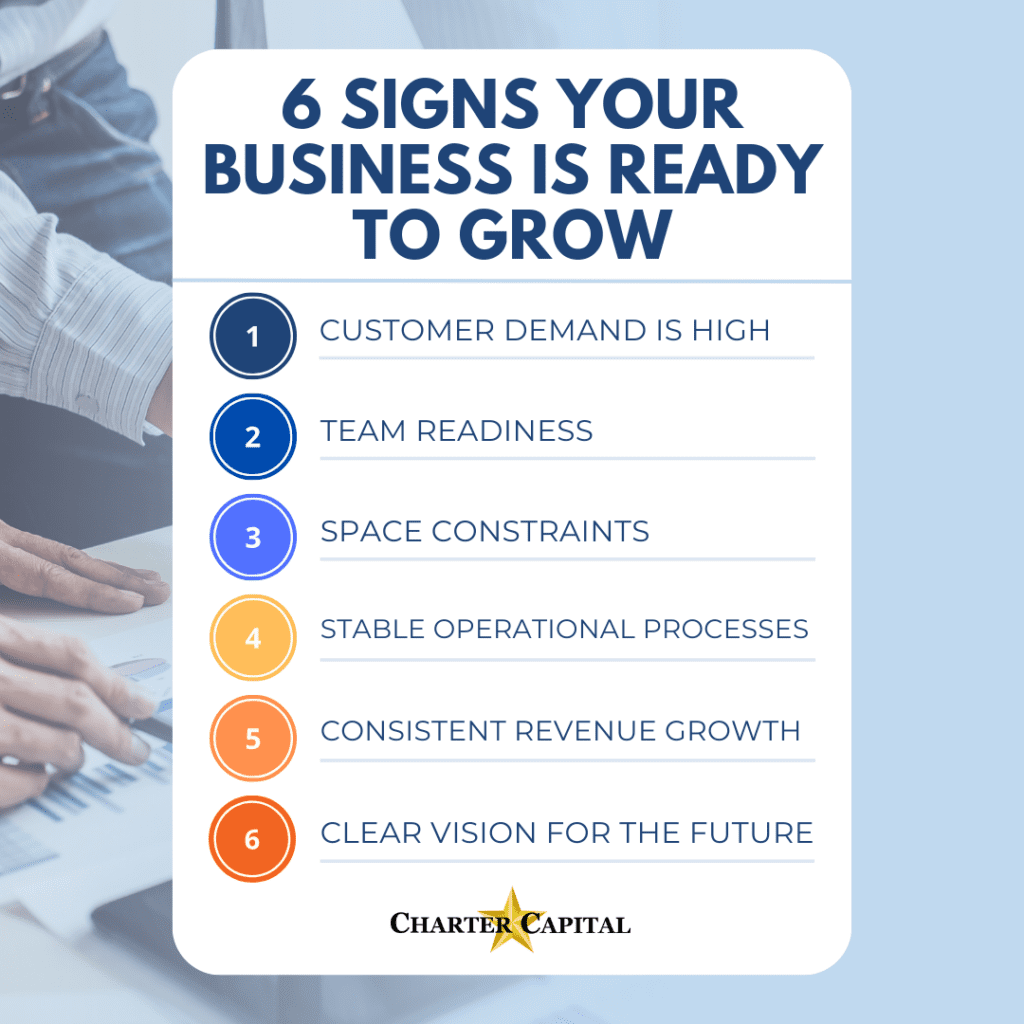
Getting business expansion timing right can be tricky. While expansion can increase profit and allow you to grow your customer base dramatically, it also makes your business vulnerable, especially if you don’t address underlying issues before scaling. On this page, we’ll explore some common signs it’s time to grow, red flags that indicate you have things to address first, and cover tips for planning your expansion.
Positive Business Growth Indicators
It may be time to grow if your business is showing signs it’s ready for expansion like the ones below.
You Have a Solid Customer Base Demanding More
One of the first things to consider when assessing readiness for expansion is whether customer demand warrants it. Your customer retention rates are a key indicator here. Find out if your current customers stay with your company and remain happy. A few other signs that demand may call for expansion include:
- Website traffic from areas you don’t serve but could.
- Searches on your website for products or services you don’t offer but could.
- Customers who travel a long distance to visit a physical location.
- Customer requests for expansion.
Your Team is Ready
Is your team prepared to take on additional duties? Do you have proper staffing levels, and is everyone fully trained? If so, they’ll be instrumental in helping your business reach the next level.
You’re Already Pressed for Space
Do you have a line out the door, more inventory than you have space, or so many desks that you can’t fit another employee? These can all be positive signs it’s time to add a location. However, it’s worth exploring other avenues, such as automation, outsourcing, and procuring storage space before you commit to a complete expansion project.
You Have Stable and Strong Operational Processes
If your operational processes are replicable and scalable, they’ll likely see you through your expansion. If you’re presently experiencing any issues related to efficiency or output now, they will multiply when your business expands.
You’re Experiencing Consistent Revenue Growth and Profitability
Just as issues in your operational processes will grow as your business does, issues with revenue and profitability will scale with your business, too. However, if your company has been showing steady growth and ongoing profitability, it’s a positive sign that you’re ready for business expansion.
You Have a Clear Vision for the Future
Sometimes, business owners try to scale their companies because it seems like the next step or something they should do, but they haven’t thought about what the future looks like, and their hearts are not really in it. This creates issues as the business scales. It’s better to stay small if you’re not excited about growing or don’t have ideas about how to scale your business and a vision for the future.
Potential Risks of Expanding Too Soon
Even if your business is giving some signs it’s ready, ignoring warning signs that it’s not and failing to address underlying issues can have serious consequences. Below, we’ll quickly review some common expansion risks so that you can manage them before you scale.
You Can Spread Yourself Too Thin
There’s only one of you. If you don’t have resources in place and aren’t prepared to delegate, you’re likely to burn out.
You May Lose Touch with the Business and Customers
Business expansion consumes a lot of energy and will likely be your focus for some time. If you’re not prepared for this, it’s easy to lose touch with what your customers want and need.
You May Outgrow Your Space
If adding space or a new location isn’t part of your expansion plans, you may quickly run out of room for inventory, administrative functions, and other business operations.
You’re Likely to Experience a Cash Shortage
When most businesses grow, they use yesterday’s lesser revenue to fund today’s higher expenses. Small businesses are especially vulnerable to cash shortages in these situations because they operate with thin margins and don’t generally have savings to cover the difference.
Access to Working Capital Will Be Limited
Rapid growth can cause unprepared businesses to crash and burn. Lenders know this and may be unwilling to provide you with funding due to the increased risk.
The Quality of Products or Services May Decline
If you don’t have processes in place to ensure scaling goes smoothly, work tends to get sloppy. You may start to experience more customer complaints and quality assurance issues. While this may not seem like a huge deal at first, it can cause irreparable damage to your brand.
Staff Morale is Likely to Plummet
Businesses that scale without putting resources in place first run the risk of overworking their employees. This kills morale and can lead to turnover at a time when retaining talented, experienced team members is crucial.
The Entire Business May Fail
Expanding too fast is one of the top reasons businesses fail, Investopedia reports. When you expand too fast, you’re likely to experience several of these issues all at once, which can cause your core business to fail even if it performed well before expansion.
How to Prepare Your Business for Successful Expansion
While the risks of expanding too soon are concerning, you can safeguard against most of them. We’ll provide a few tips on how to do this below.
Set Clear Expansion Goals
There are lots of ways to expand your business. Map out your plan, complete with milestones, so it’s easier to plan for each stage.
Gather Resources and Capital
The small business community is underserved by traditional lending options, and most businesses do not receive all the funding they need. Before you begin, identify alternative ways to obtain working capital, such as invoice factoring. Also, ensure you have the people and tools required to handle the new workload before starting.
Seek Expert Guidance and Mentorship
Connect with lawyers, accountants, funding specialists, consultants, and other experts who can guide you through the process and provide advice. Get honest feedback from your advisors and proactively explore potential issues in your expansion plans. That way, you can fill gaps and address issues before they cause a problem.
Optimizing Growth Strategies: Expanding Your Business into New Markets
Expanding your business is an ambitious yet achievable goal that requires a blend of strategic planning and acute market insight. For small businesses and larger enterprises alike, the journey toward business growth encompasses a variety of growth strategies and types of business expansion, each tailored to the unique needs and aspirations of the business. At the heart of successful business expansion strategies lies the imperative to not only grow your customer base but also to enhance your product or service range, ensuring that new offerings resonate with both existing and potential customers.
Delving into market research is indispensable for businesses aiming to expand their market reach or explore new markets. It enables business owners to make informed decisions about the best strategies to expand their business, including entering new locations, tapping into international markets, or even starting a franchise. A comprehensive business expansion plan should consider the current market conditions, identify the target market, and leverage marketing strategies that promote effective growth and market penetration.
Moreover, expanding into new markets or diversifying your product lines can dramatically enhance your market share and drive revenue growth. However, this endeavor requires a detailed understanding of market trends, customer demands, and the competitive landscape. Strategies such as market segmentation, robust marketing plans and engaging in marketing efforts targeting new customer segments are crucial for achieving sustainable growth. Expanding into a new market and tapping into new customer bases require strategies to grow your business that are both innovative and focused on long-term success.
Businesses looking to diversify or strengthen their market presence must also consider the potential for franchise opportunities or the development of new products or services that meet the evolving needs of their target market. Expanding your business into new markets or sectors can offer new opportunities and challenges, but with the right expansion strategy, including thorough market research and a clear understanding of your business goals and objectives, businesses can navigate these waters successfully.
Ultimately, the decision to expand should be based on a strategic assessment of your business’s current performance, growth potential, and specific business expansion strategies that align with your long-term vision. Whether it’s expanding your operations, exploring new market opportunities, or leveraging existing business assets for growth, the path to expansion is multifaceted. By focusing on strategies that help your business grow, such as tapping into new markets, offering new products or services, and enhancing your market reach, you can ensure that your expansion efforts lead to effective growth and help take your business to the next level. Strategies to expand your business and promote growth are essential for navigating the complexities of entering new markets and achieving long-term success.
Prepare for Business Expansion with Invoice Factoring
Invoice factoring is an ideal funding solution when you’re expanding because most businesses with B2B invoices qualify. Plus, you can get established with a factoring company like Charter Capital before you need funding, so it’s easy to obtain cash when you do. Factoring also scales with your business and allows you to tap into additional funding as your business grows. To learn more or get started, request a complimentary factoring rate quote.

- How to Use Customer Feedback to Boost Small Business Growth - July 8, 2024
- 10 Smart Ways to Leverage AI in Customer Service - June 10, 2024
- Focusing on Business Goals: 6 Ways to Stay Targeted - May 13, 2024

